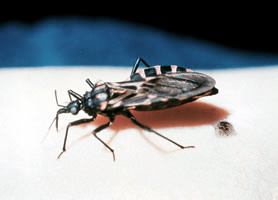A pair of scientists at The University of Texas at El Paso is one step closer to developing the first ever clinical Chagas disease vaccine.
Researchers Rosa Maldonado, Ph.D., and Igor Almeida, Ph.D., both faculty in the Department of Biological Sciences, recently were granted a patent for “Mucin-Associated Surface Protein As Vaccine Against Chagas Disease.”

Image/CDC
“We dream of this [a vaccine for Chagas disease], but we don’t know it is going to happen,” Almeida said. “You dream to get something to help the people and you expect to make at least a small contribution,” Maldonado shared.
The preventive vaccine had been in development since 2008 and most recently was tested at the Texas Biomedical Research Institute (TBRI) in San Antonio on nonhuman primates in collaboration with John VandeBerg, Ph.D. Results are promising and may lead to clinical trials in the coming years.
A second vaccine, based on synthetic parasite sugars, in collaboration with Katja Michael, Ph.D., associate professor in the Department of Chemistry at UTEP, also was tested in nonhuman primates at TBRI and yielded very promising results. Almeida started work on that vaccine 27 years ago and is currently awaiting patent approval. The vaccine studies were funded by the Kleberg Foundation and the National Institutes of Health.
“The big problem with Chagas disease is heart failure,” Maldonado explained. “We have determined the inflammation in the heart and the parasitic load significantly decreased, and this vaccine is protecting the animals from the disease. These are the first synthetic vaccines tested in a non-human primate model ever.”
The UTEP scientists said that 6 million to 8 million people are chronically infected with the potentially life-threatening Chagas disease. Chagas is caused by the parasite Trypanosoma cruzi, which is transmitted to animals and people by insect vectors known as kissing bugs. The disease has been endemic in Latin America, but is rapidly spreading through the U.S., Europe and other nonendemic regions as a result of globalization. Yet, there is no clinical vaccine, although there have been several experimental efforts throughout the years.
Both UTEP researchers confirm kissing bugs are in the Paso del Norte region that includes El Paso, have been caught and tested, and many turn out positive with Trypanosoma cruzi. The number of people infected, though, is underreported because symptoms may take decades to turn up and doctors don’t regularly test for this tropical disease.
Read more at The University of Texas at El Paso
Related:


